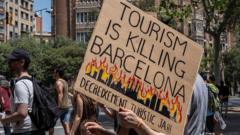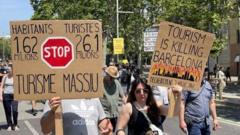Following a tragic militant attack that resulted in the deaths of 26 people near the scenic town of Pahalgam, Indian-administered Kashmir, tourism is slowly starting to pick up again, but uncertainty prevails as tensions rise between India and Pakistan. Local businesses fear long-term effects on their livelihoods as cancellations skyrocket and safety concerns linger.
Tourism in Kashmir Faces Uncertainty After Militant Attack

Tourism in Kashmir Faces Uncertainty After Militant Attack
A recent deadly attack near Pahalgam has impacted the tourism sector, leaving visitors hesitant and local businesses struggling.
One week after a militant attack near the picturesque town of Pahalgam in Indian-administered Kashmir left 26 people dead, the tourism landscape is slowly changing from one of despair to tentative hope. While the town's once-bustling streets were deserted in the wake of the tragedy, small numbers of visitors are beginning to return, giving local businesses a glimmer of hope.
The attack occurred last Tuesday when militants opened fire on tourists visiting the Baisaran meadow, causing devastation not only to the victims' families but also to the reputation of the region known as the "Switzerland of India." As anger spread across the nation, tensions between India and Pakistan intensified, with both nations greeting the incident with finger-pointing and retaliatory measures.
In response to the escalating situation, the local government has closed over half the region's tourist attractions to assess security risks. This unprecedented attack on tourists has shaken the core of the local economy, heavily reliant on the influx of visitors. Among those worried about the impact on their livelihoods is Rafi Ahmed, a shawl-seller who reported minimal sales after an extended period without tourist traffic.
Despite feelings of fear following the attack, some travelers have opted to stay, citing high flight prices as a primary reason. Akshay Solanki, a tourist from Mumbai, described a sense of panic among his group on the day of the attack. Others credit the community's reassurances and the presence of local authorities for instilling a sense of security.
Bollywood actor Atul Kulkarni visited Pahalgam shortly after the incident, encouraging tourists to come back to the region. He asserted that a united response against the terrorists must come in the form of tourists returning to enjoy the beauty of Kashmir.
However, many in the area remain apprehensive. Business owners and residents express concern about the long-term implications of the recent violence. The upsurge in security operations, including detentions and demolitions of alleged militant homes, has added to the atmosphere of unease as local leaders yearn for normalcy to return.
Booking cancellations reportedly stand as high as 80-90%, according to prominent tour operators, while a sense of impending conflict looms over the region. The recently anticipated inauguration of the world's highest railway bridge is now shrouded in uncertainty due to the attack.
Though leaders like Chief Minister Omar Abdullah have expressed sorrow for the victims and their families, they also recognize the emotional and economic implications of the attack. The sense that Kashmir is losing its grip on safety and tourists reignites questions about the future of the region, which has fought hard for stability and growth in recent years.
With the general elections slated for 2024, tensions are expected to rise as local leaders push for renewed tourist engagement in hopes of countering the damages done by violence. As Pahalgam cautiously welcomes back a trickle of tourists and hopes for recovery, the battle to regain trust and safety continues.





















